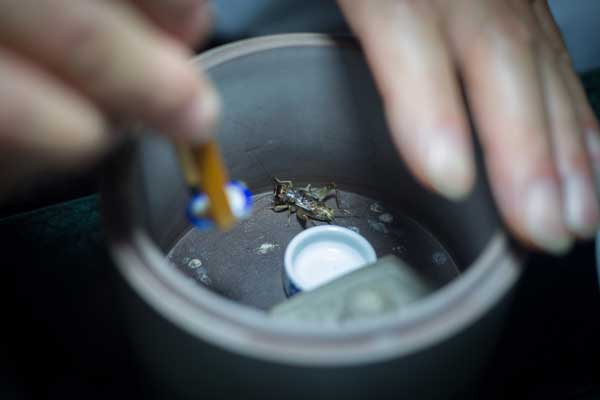Classic clash of the crickets
 |
|
Trainer Gu Haifang carefully feeds a fighting cricket in his cramped Shanghai apartment. One of eight selected to battle in the city's cricket tournament, the gladiator has been fed a special diet to get fully prepared.[Photos by Gao Erqiang] |
It's two weeks to go before plucky Purple Golden Wing jumps into the arena for his once-in-a-lifetime fight.
To prepare, the promising gladiator is shifting from his staple diet of corn, wheat and rice to a more carnivorous fare of shrimp, goat liver and snake meat to "get fully charged" for the fight, said his trainer and patron.
Purple Golden Wing is a cricket, a species of the purple kind, the most aggressive among the six common types.
For the past two months he and another 100 or so crickets have been carefully looked after by retired property manager Gu Haifang in a corner of his cramped apartment in Shanghai.
Purple Golden Wing is one of the few — eight to be exact — of the elite class selected from a hundred candidates found in fields of Henan province by the 63-year-old cricket master as he sought a champion to battle in the city's final fight of the year in October.
The contest Gu and Purple Golden Wing entered, a cricket fighting competition in Lyuhua town in Chongming county, is one of the largest in town, if not the country.
Interest in authentic Chinese pastimes, rather than hobbies such as golf or karaoke, is on the rebound. Cricket fighting, a tradition cultivated by emperors in the Tang Dynasty (618-907) and revived over the past two decades, is making a comeback.
"It's a very 'intelligentsia' game, but at the same time masculine enough," said Gu, who first embraced the hobby at the age of seven in the alleys of his hometown under the guidance of his father.
The self-described "thrifty diehard" spends 10,000 yuan ($1,634) or so every year on his passion. Money aside, it takes him at least five hours a day to feed, bathe and examine his 100-plus warriors, even dropping females one-by-one into their "bedrooms" every night to "cheer them up". He separates them in the morning.
"My wife complains that I am like having a hundred babies every year at this season," he said.
But he doesn't find it eccentric because the "craze is very common among (his) many cricket friends".
At several flower and bird markets in the metropolis — where a variety of plants, birds and even pet insects are sold — small crickets priced from 10 to thousands of yuan each have occupied the most conspicuous place at almost every stall since August.
Some vendors have even transformed their entire space into cricket stores.
"Four to five hundred (crickets) can be sold in a day in good times like weekends," said Liu Hang, a stallholder at Wanshang flower and bird market, the largest of its kind in the city. He has been in the cricket trade for nearly a decade.
"Business has been going up every year and buyers are very generous with these small creatures, although they live only three months," he added.
















